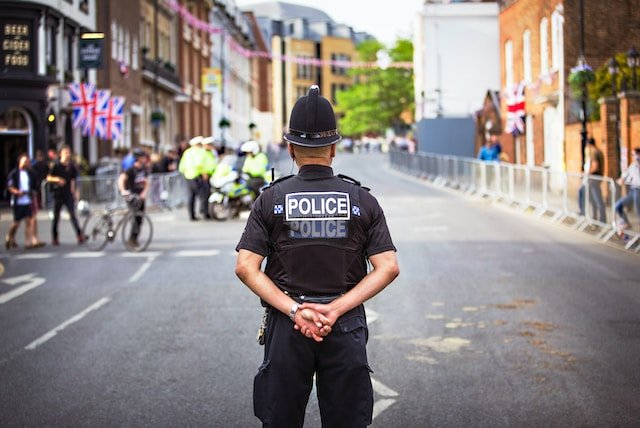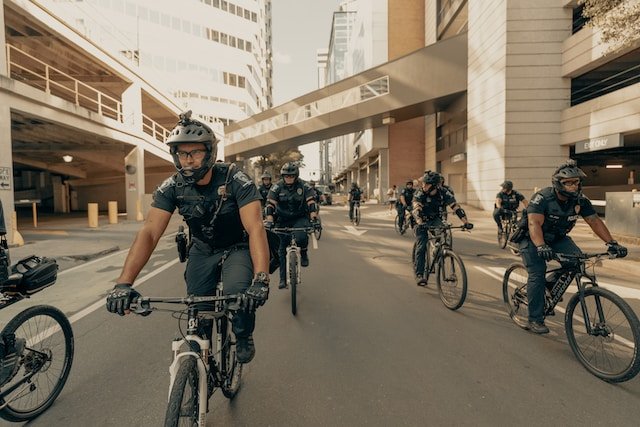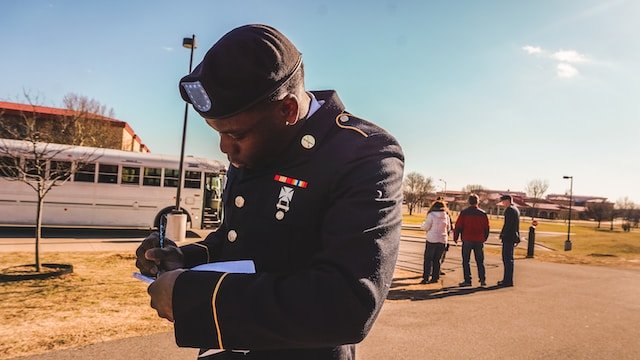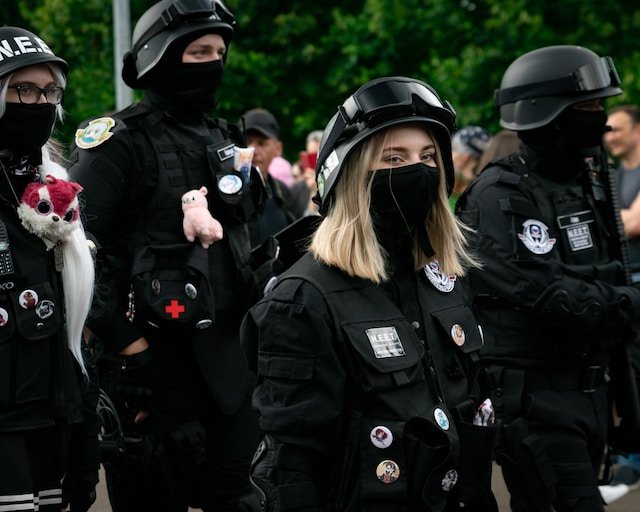Is There A Height Requirement To Be A Police Officer
In a lot of jurisdictions, there isn’t specific requirements for height to be an officer in the police force. The criteria for hiring are typically based on the essential abilities such as physical fitness and academic qualifications. Police departments strive to build an inclusive and diverse force that allows individuals of various sizes to be effective. The focus is on competency professionalism, professionalism, and dedication to ensuring the law rather than physical appearance.
What Is The Best Height For Police?

Police work is a noble profession that requires physical fitness as well as mental sharpness. The duties of a police official encompass many responsibilities, including engaging with the community, preventing crime, and ensuring the safety of the public. In assessing the importance of height to police work, it is important to think about the many challenges that police officers face on a daily basis.
Height and Public Perception
The height of police officers will affect how they are perceived by the general public. Officers who are taller may be perceived as more powerful and authoritative and could assist in calming volatile situations. But, it’s important to make clear the fact that a police officer’s effectiveness cannot be judged solely by their size. The ability to communicate, empathy, and training all play important roles in establishing confidence within communities.
Height and Physical Tasks
A typical police job typically includes physical work like conducting investigations, arrests, or dealing with emergencies. Officers who are taller may have advantages in interacting with those in remote areas or performing certain moves. However, shorter officers may show amazing agility and adaptability, which makes them equally effective in particular situations.
The Need for Inclusivity and Diversity in Policing
While height may have an effect on specific aspects of policing is crucial to make clear the importance of having a diverse and inclusive police force is essential. Police must be reflective of the community they are serving by looking at a variety of backgrounds, attributes, and abilities. Police with diverse backgrounds will better understand the needs of the community and develop stronger relationships based on trust and respect.
Factors beyond height that define the ideal police officer
A trained police officer has the skills and knowledge required to effectively handle a variety of situations. A comprehensive training program that covers conflict resolution, community policing methods, de-escalation, and ethical behavior is vital for any professional in law enforcement.
1. Communication Skills
Effective communication is the foundation of the effective practice of policing. Police officers need to be skilled in being active listeners and have clear communication in order to communicate with people from every sphere of life. They must also foster positive relationships with their community.
2. Emotional Intelligence
The ability to recognize emotions is an essential characteristic that police personnel must possess. Being able to recognize and manage their emotions, both their own and the emotions of their colleagues, enables them to act calmly and with a sense of purpose even in situations of high stress.
3. Problem-Solving Abilities
Police officers are often faced with difficult and complex situations that require quick thinking and a practical approach to problem-solving. Being able to evaluate situations and make educated choices is essential for successful law enforcement.
4. Compassion and Empathy
A well-trained police officer exhibits compassion and understanding towards the people they come across. This empathy fosters a sense of trust and collaboration, which strengthens the bond between law enforcement officers and the citizens.
How Tall Is The Bare Minimum Of Police Officers In The US?

Police departments across the US have specific requirements to recruit police officers. One of the elements they look at is the requirement for height. The required height for policemen has always been a topic of curiosity for those who are interested in becoming police officers and those seeking to learn more about the field. Let’s look into the specifics and provide more information on this important aspect.
Understanding the Minimum Height Requirements
The height requirements for police officers may differ from one police department to the next in that different departments establish their own standards based on the nature of their work and the equipment employed, along with other operational factors. It is important to keep in mind that there’s no law that governs the required height of police personnel in the United States.
Factors Influencing Minimum Height Standards
Although there isn’t a uniform height standard set by federal authorities, a few police departments in different cities and states can set their own rules. The guidelines are affected by the following elements:
1. Job Responsibilities
The nature of work for police officers is physically challenging. Police officers have to be able to react swiftly to emergency situations as well as chase suspects away, and operate various tools. So, some departments require a minimum height in order to ensure that applicants can carry out their jobs efficiently.
2. Public Perception
In certain instances, the taller officers could be perceived to be less authoritative. This may affect the way people perceive police officers. This perception can lead agencies to take into consideration tallness requirements when selection process for hiring.
3. Ergonomics and Equipment
Law enforcement officers have an array of tools like gun belts for duty as well as body armor. An upper limit of a certain height could be set so that officers can comfortably and safely utilize their equipment in their everyday work.
4. Uniform Sizing
Police uniforms are uniform, and the requirement of a minimum height can assist in fitting officers in the appropriate sizes to present an elegant and professional appearance.
Height Requirements Across Different Police Agencies
As we’ve mentioned before, there’s no universal solution to the minimum size of police personnel. Let’s look at a few examples of height requirements set by particular police departments:
1. New York City Police Department (NYPD)
The NYPD is one of the largest police departments in the United States and has no specific minimal height limit. However, applicants need to meet certain physical requirements for fitness to be eligible for the academy.
2. Los Angeles Police Department (LAPD)
The LAPD doesn’t have a minimal height requirement. They have instead created a physical ability test that applicants must pass in order to be eligible for the academy.
3. Chicago Police Department (CPD)
The CPD is also not able to establish any specific height requirements for police personnel. They are focused on the physical fitness of the officers during the process of gaining their officers.
Overcoming Height Requirements
For those who are worried about being tall enough to meet the requirements of specific police departments, It is important to realize that height is only one element of a person’s ability to work in police work. There are many other characteristics that police agencies look for like:
1. Physical Fitness
A good level of physical fitness, irrespective of how tall, is essential for police officers in order to complete their job efficiently.
2. Communication Skills
Communication skills are essential for police officers to communicate with people, manage conflicts, and collect details.
3. Problem-Solving Abilities
Professionals in law enforcement often face complicated situations which require quick thinking and a sharp problem-solving ability.
4. Emotional Intelligence
Police officers must show emotional intelligence in order to deal with emotional and stressful situations with compassion and compassion.
Which Is The Best Age For Police?

Physical fitness is an essential element of a law enforcement officer’s work. Police officers are typically expected to be physically active throughout their duties, including patrols on foot, following suspects, and handling urgent situations. Candidates who are younger, usually between the ages of 20 and 30, might have superior physical abilities, allowing them to respond quickly to the most challenging situations.
But age shouldn’t be the only factor that determines physical fitness. A proper fitness and training program can assist people of all years maintain their performance at a high level. As we age, we gain experience, and even experienced police officers who are in their 50s or 40s could remain in top condition if they focus on their health and have regular physical examinations.
Mental Maturity and Emotional Intelligence
Alongside physical ability, mental maturity and emotional intelligence are essential qualities to police officials. Police work involves handling high-pressure circumstances, traumatic incidents, and emotionally charged interactions. Senior citizens could have a head start in this field, as their experiences in life can provide them with a greater understanding of human behavior as well as managing emotions.
Yet, students of younger ages have the potential to be successful in these areas with the right training and guidance. Age shouldn’t be the only element in determining emotional intelligence because it is a skill that can be developed and developed as time passes.
Experience and Wisdom
Experience plays an important role in the efficiency of police officials. The officers who have been in the field for a long time bring decades of knowledge and experience to their job, which could significantly affect their ability to make decisions and solve problems. An array of experience can help older officers handle difficult situations with confidence and effectiveness.
However, younger applicants may not have the knowledge, but they can compensate by displaying energy, flexibility, and creative thinking. By creating a stimulating atmosphere that encourages collaboration between older and more experienced officers, Law enforcement agencies are able to make use of the strengths of various age groups.
Relatability and Community Engagement
Law enforcement agencies strive to build trust and build relationships with the community they represent. The ability to establish trust is an important aspect in this in this regard. Police officers who can communicate with individuals of different types of ages are more likely to create positive relationships in the community.
Younger officers might have a greater chance of connecting with younger people, whereas older officers might be more successful when working with older people in the community. But, a successful community engagement depends on recognizing and respecting the beliefs and values of all age groups regardless of the officer’s age.
The Role of Technological Proficiency
In this digital age, technology is a must for law enforcement officials. Candidates who are younger, having grown to be in the era of technological advancement, usually have a higher degree of confidence and proficiency with the latest tools and systems.
But, older officers can overcome this gap by engaging in constant learning and keeping up-to-date with the most recent advancements. A lot of more senior officers bring decades of experience to their job that can prove invaluable in blending traditional methods of policing and modern technology.
Do You Have To Be Taller Than A Police Officer In Canada?

Before we get into the size requirement, it’s important to comprehend the entire selection process to become police officers in Canada. Police departments in Canada adhere to a strict and rigorous recruitment process to make sure they pick the most qualified candidates that can maintain an uncompromising standard of excellence in services as well as public security.
The process of selecting candidates typically includes various stages, which include
- Application: The initial step is to apply to the police department you prefer. Candidates are required to submit complete information about their education, experience in the field as well as their personal background.
- Written Exam: Candidates who have passed the written test will be asked to sit for the written test. The test tests their abilities to think, critical thinking, and problem-solving abilities.
- The Physical Fitness Test Police officers must pass an exercise test to test their physical fitness and to ensure that they are able to handle the demands of their job successfully.
- Background Investigation Background Investigation: A thorough background check is conducted to confirm the applicant’s background, which includes criminal records checks, references and the applicant’s employment background.
- Psychological assessment: To confirm that the candidate’s mental capacity is suitable for the job, the candidate must undergo an evaluation of their mental health.
- Medical Exam: A thorough medical exam is performed to determine whether the applicant is in good psychological and physical health standards.
- Interview: Candidates selected for an interview will be interviewed to evaluate their interpersonal skills, their communication abilities, and overall fit for a job with law enforcement.
- Training: Successful applicants are accepted into an academy of police training in which they are given rigorous training to acquire the required capabilities and know-how to be able to work for police officials.
Addressing the Height Requirement
Let’s now tackle the most important question What is the size requirement for being an officer in the police force of Canada?
The answer is no, there isn’t a particular height requirement imposed by Canadian police agencies. The process of selection is designed to determine the skills, abilities, and overall fit for the position, not focusing on physical attributes such as height.
The absence of the requirement for height is in accordance with the values that promote equality, diversification, and inclusion, which Canadian authorities in law enforcement abide by. They seek to recruit people with different backgrounds and experiences in order to reflect the diverse communities they serve.
Emphasizing Skills and Abilities Over Physical Attributes
Canadian authorities in law enforcement are aware that effective police work requires a team of diverse members with a wide range of talents and capabilities. The job of police officers is a multifaceted one that encompasses involvement in the community, problem-solving, and conflict resolution, as well as law enforcement. They are able to focus on the qualities of
- Communications Skills: Officers in the police force should be able to communicate with individuals of different backgrounds, defusing tensions by giving clear and concise information.
- Critical Thinking: The capacity to think critically and make solid decisions under pressure is essential for police officers since they are often faced with challenging and dynamic situations.
- Empathy and compassion: A sense of compassion and empathy helps police officers approach their work with compassion and understanding in establishing positive relationships with the local community.
- Collaboration: Law enforcement officers regularly collaborate with their colleagues as well as other agencies, which makes the ability to work in teams essential to be effective in law enforcement.
- Problem-Solving: Law enforcement personnel confront a myriad of problems every day, which requires a strong ability to solve problems to tackle issues efficiently.
Inclusive Hiring Practices
As we’ve stated, Canadian law enforcement agencies have a strong emphasis on inclusive hiring practices and recognize the importance of diversity within their ranks. This strategy helps build stronger bonds with the people they work with, as well as builds trust and collaboration between law enforcement personnel and the general public.
By focusing on the candidate’s capabilities, skills, and individual qualities instead of physical traits like height, police organizations are able to draw a larger group of highly skilled individuals who are dedicated to protecting and serving their communities.
FAQ’s
Is there a height requirement to be a police officer?
Some police departments or agencies may have height requirements, while others do not. The requirements, if present, can differ based on the jurisdiction, state, or country. It is best to check with the specific police department or law enforcement agency you are interested in to know their exact height requirements.
What is the rationale behind height requirements?
The rationale for height requirements in law enforcement has historically been related to physical fitness and ability to perform certain tasks. Taller individuals might have an advantage in certain situations, such as when it comes to reaching or subduing a suspect. However, many modern police agencies focus more on overall physical fitness and capability rather than just height.
Are height requirements discriminatory?
Height requirements have been a subject of debate, as some argue that they may disproportionately impact certain demographics and could be considered discriminatory. In some cases, height requirements have been challenged legally and amended to be more inclusive.
Do height requirements vary for different roles within law enforcement?
Yes, some agencies might have different height requirements based on the specific role or position within the law enforcement organization. For example, requirements might differ for police officers, detectives, or specialized units.
What other qualifications are typically required to become a police officer?
Apart from height (if applicable), common qualifications to become a police officer usually include age restrictions (typically 21 years or older), citizenship or legal residency requirements, educational background, physical fitness standards, passing written and physical exams, and a clean criminal record.
Are there alternatives to height requirements?
Many police departments have been moving away from strict height requirements and focusing on overall physical fitness and competency evaluations. This approach allows for a more inclusive and diverse pool of candidates, emphasizing a wider range of skills required for modern policing.


















